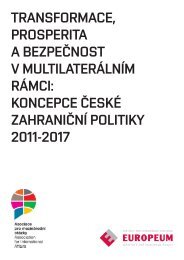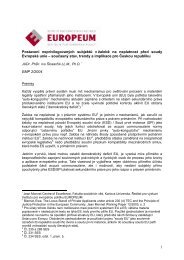eu constitutionalisation - EUROPEUM Institute for European Policy
eu constitutionalisation - EUROPEUM Institute for European Policy
eu constitutionalisation - EUROPEUM Institute for European Policy
You also want an ePaper? Increase the reach of your titles
YUMPU automatically turns print PDFs into web optimized ePapers that Google loves.
Chapter 8: EU Development <strong>Policy</strong> in the Constitutional Treaty: a Step <strong>for</strong>ward?<strong>European</strong> External Action ServiceEstablished on the basis of Article III-296, the <strong>European</strong> External ActionService (EEAS) should assist the <strong>European</strong> Foreign Minister in fulfillingher/his mission. The service, as elaborated in a declaration attached tothe draft treaty, should consist of staff from relevant departments of theCouncil’s Secretariat and of the Commission. Second, it can involve civilservants from national diplomatic services of the member states. Accordingto the declaration, it should have the responsibility <strong>for</strong> providing staff <strong>for</strong>EU delegations in third countries and at international organisations, whichare, according to Article III-328, placed under authority of the EFM. If ithappens really, it will depend on the Council’s decision.The establishment of the External Action Service raises a number of questions.The treaty does not precisely define who will <strong>for</strong>m the service: onlythe diplomats working in the Council’s Secretariat and in DG RELEX,or will it also include officials from other directorates with relevance tothe external action field? Will all delegation staff be a part of the ExternalAction Service? There is an element of risk in every option. Assuming thatthe External Action Service would also include development or trade specialists,it would mean that they come directly under the authority of theEFM. However, this system should respect the fact that the developmentis the Community’s competence and fully within the executive powersof the Commission. This, in turn, demands new common managementstructures, because of possible tensions with development services in theheadquarters in Brussels²⁶.A major reorganisation could destabilise and endanger achievements madeduring the ongoing re<strong>for</strong>m. On the other hand, better career prospectswould contribute to the professionalisation of the development service. Itwould probably also be more advantageous in the end than the situationin which only <strong>for</strong>eign policy officials would be included into the EEAS andthe development issues would be marginalized²⁷.26) Ibid., p. 16.27) Ibid., p. 17.Chapter 8: EU Development <strong>Policy</strong> in the Constitutional Treaty: a Step <strong>for</strong>ward?CONCLUSIONThe position of development cooperation in the constitutional treaty hasbeen improved in comparison to the previous situation. The most importantchanges refer to the anchoring of the fight against poverty in the treaty, givingit a clear legal basis. It refers also to the ef<strong>for</strong>ts made in order to ensure coherencein the EU’s external actions. The treaty strengthens the EU’s profile onthe international scene and its strategic vision. On the other hand, some otherprovisions may endanger the positive outcome of IGC. How it will functionin practice, <strong>for</strong> example whether the further subordination of developmentcooperation to the CFSP will take place or not, is to be seen.Future developments will also be influenced by the personal skills andpolicies conducted under the leadership of the new Commissioner <strong>for</strong>Development, a <strong>for</strong>mer Belgian <strong>for</strong>eign minister, Louis Michel. Will he givenew impetus <strong>for</strong> the EU development policy? The improvements are possible,also be<strong>for</strong>e the new treaty will come into <strong>for</strong>ce: more complementaritybetween the development action of the EC and member states, furtherharmonisation of development instruments, and increased overall effectivenessof EU development cooperation in the eradication of poverty²⁸.The developments up to date show that the Commissioner Michel who ismuch more visible and active character at the <strong>European</strong> and internationalscene than his predecessor, takes a lot of new initiatives and it influencespositively the <strong>European</strong> development policy’s position.Last but not least, a crucial matter is the attitude of newcomers to developmentcooperation. New member states do not have a lot of experience incontacts with the developing countries and its policy towards them is still tobe developed. The same refers to the societies in which development issuesare not known, nor are the people used to helping the third world. Thissituation bears not only dangers. It could also mean that the new memberstates, the majority of whom do not establish their own policy towardsthe poorest, will want to channel aid through the EC institutions, thusstrengthening its importance. On the other hand, no interest in developmentcooperation may cause its marginalization and loss of significance,shifting the EC activities’ focus towards other issues. Which option willwin requires further studies.28) Ibid., p. 22.294295








